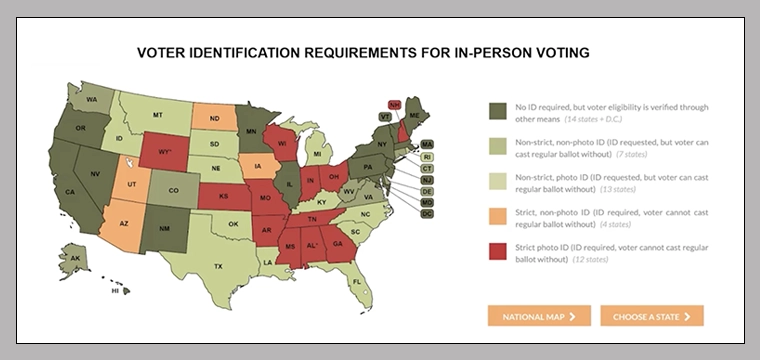
Leaders from UNC Charlotte and Duke overview the national picture with a focus on NC
North Carolina was a key battleground state when it came to voting rights last year. The stark division between political parties kept many campuses guessing whether their campus IDs would be accepted at the polls.
Some institutions made changes to their issuance process and provided specialized IDs for the sole purpose of meeting requirements. Others were in the middle of a debate as to whether a mobile credential was ‘as acceptable’ as a physical card.
Two campus administrators who experienced this firsthand guided the discussion in the NACCU-hosted webinar – Debbie DeYulia, Director of Duke Card Services at Duke University and Roman Farhrman, Director of IT for Business Services at the University of North Carolina, Charlotte.
Duke's mobile ID was declined because they did not require users to upload a government ID when they submit their photo and they didn't have an expiration date.
Voter ID requirements vary from state to state. Some require photo IDs, and in some cases college or university IDs approved by the State Board of Elections are accepted. Typically, student voting eligibility depends on voter registration and residency status – students can vote locally if they update their registration. Otherwise, they must vote by mail in their home state.
Fourteen states and D.C. do not require an ID. North Carolina has a "non-strict, non-photo ID" policy, allowing provisional ballots or affidavits for those without proper identification.
In North Carolina, more than 100 institutions had their IDs approved for the last election. This is an annual process, and each campus must resubmit for the new year.
Key rules for acceptance include:
In addition to the many campuses submitting their physical cards, Duke submitted their mobile ID for approval. It was denied.
“The two reasons were that we currently don't require folks to upload a government ID when they submit their photo,” explains DeYulia. “The second reason was we didn't have an expiration date and at that time we didn't have a way to put that on the mobile credential.”

At UNC Charlotte, changing voter ID laws coincided with reissuance of NFC credentials, rebranding, and ultimately a mobile credential launch. Farhrman explains that issues with expiration dates and disparities between iPhone, Samsung, and Android use cases kept them from submitting their mobile ID to for consideration.
Initially Chapel Hill's was accepted because they used a custom field in mobile ID to display an expiration date. This worked for them was because they only issued iPhone credentials.
UNC Chapel Hill’s mobile ID was approved, but shortly before the election it was struck down by the court of appeals.
Initially it was accepted because they used a custom field in mobile ID to display an expiration date which then shows up in the app. The reason this worked for them was because they only issued iPhone credentials, so Android and Samsung challenges did not apply. Still, in the end the acceptance was reversed.
The webinar provides an in-depth look at the use of campus cards for voter ID with specific attention paid to the particular challenges for mobile credentials.
Tune in to NACCU<em>TV</em> to watch the webinar




